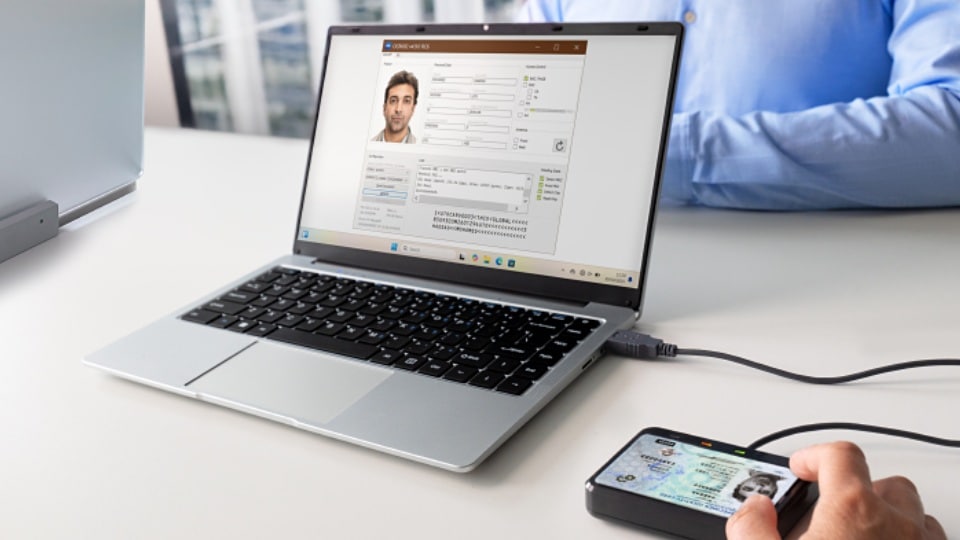According to HID, slow, multi-step ID verification processes can cause frustration and drain staff productivity, yet businesses still subject themselves to these inefficiencies daily. While over 1.2 billion electronic national ID cards already exist worldwide, countless businesses still rely on inefficient ID card scanners that turn simple verification into a multi-step ordeal.
Discover how to select ID card scanners that eliminate verification delays before they eliminate your competitive edge. This blog reveals the technology driving global electronic ID adoption, identifies which industries face immediate pressure to upgrade and breaks down the essential features that separate professional-grade ID card scanners from legacy devices that sabotage customer experience.
A brief history of national ID cards
National identification systems trace their origins to the Ottoman Empire in 1844, when governments first recognized the need to strengthen state institutions through standardized identification.
World War II catalyzed widespread adoption as countries recognized the critical importance of robust identification methods during and after the conflict. In the United States and United Kingdom, the debate around national ID cards has been ongoing, reflecting concerns about privacy and security.
Over time, national ID cards have evolved into more sophisticated forms. Today’s national ID cards represent the latest evolution in this progression, offering enhanced security through tamper-proof chips and standardized verification processes that enable both government efficiency and cross-border interoperability.
What has driven electronic ID card adoption?
Several key factors have driven worldwide adoption:
- Enhanced digital identity security — Governments minimize ID fraud by integrating tamper-proof chips in electronic ID cards. These technologies provide robust security features that protect sensitive information and reduce identity theft risks.
- Streamlined public services — electronic ID cards enable citizens to access government services more quickly and efficiently, eliminating bureaucratic delays and reducing administrative costs
- International standards compliance — Alignment with International Civil Aviation Organization (ICAO) standards, including Doc 9303, ensures cross-border and cross-industry operability, allowing smoother integration between different national and international systems
- Large-scale national deployments — Governments across Europe, Middle East, Africa, Latin America and Asia equip their citizens with national ID cards through comprehensive initiatives that facilitate everyday transactions.
Industries and use cases impacted by electronic ID card verification
The shift to electronic ID cards has revolutionized identity verification across multiple sectors that rely heavily on face-to-face customer interactions, particularly in Europe, the Middle East, Africa, Latin America and Asia:
- Banking and Financial Services —Know Your Customer (KYC) processes require fast, reliable ID verification for new customer onboarding in branch locations. Banks can benefit from ID card scanners that quickly read ID-1 MRZ and chip data, ensuring smooth, secure verification without relying on smartphone-based solutions.
- Telecommunications and Retail — Customer enrollment for mobile and internet services depends on secure, compliant identity checks. Employees can verify new subscriber identities using ID card scanners, maintaining high trust levels while minimizing fraud risks and data entry errors. Microcredit services increasingly rely on ID card verification to streamline approval processes. Retailers selling age-restricted products like tobacco and alcohol use ID card scanners to ensure compliance with age verification laws and avoid costly penalties.
- Healthcare — Hospitals and pharmacies can use electronic national ID cards for patient registration and secure verification when accessing medical services and issuing prescriptions, ensuring accurate patient identification and reducing medical errors.
- Elections — Voter ID verification ensures secure, efficient electoral processes. Electronic ID-compatible verification systems, supported by ID card scanners, maintain integrity and credibility throughout voting procedures, particularly during high-volume election periods.
This is just a portion of the HID guide to choosing the right ID card scanner, read the full blog to discover the challenges businesses face with electronic ID card verification, how to choose the proper solution, and adapting to the electronic ID card reality that is coming. Read the whole blog, here
For more HID news, click here





